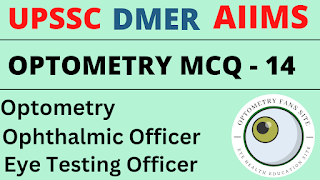Ophthalmic Officer, Eye Testing Officer and Optometrist important multiple choice questions series for DHS Exam, DMER exam, AIIMS exam, UPSSSC exam, to preparation.
Ophthalmology and Optometry MCQ Series Part 14
1.Photophthalm a or Snow blindness is caused by:
a. Ultraviolet rays
b. Infrared rays
c. Gamma rays
d. X-rays
2. Donor cornea is harvested from cadaveric donors with what time interval of death?
a. 3 hours
b. 6 hours
c. 2 days
d. 16 hours
3. Which of the following is not an absolute contraindication for corneal transplantation?
a. TB Meningitis
b. Rabies
c. Death due to unknown cause
d. SSPE
4. Which of the following statement regarding corneal transplantation is true:
a. Whole eye is preserved in tissue culture
b. Donor is not accepted if age is more than 60 years
c. Specular microscopy is used to assess endothelial cell count
d. HLA matching is mandatory
5. Signs of graft rejection are all except:
a. Krachmer' s spots
b. Khodadoust line
c. Graft edema
d. Epithelial rejection line
e. Foster's spots
6. Percentage of endothelial cell loss after Descemet' s stripping Automated Endothelial Keratoplasty (DSAEK)
a. 5%
b. 10-20%
c. 30-40%
d. 50-60%
7. Sclera is thinnest at:
a. Limbus
b. Equator
c. Anterior to the attachment of supenor rectus
d. Posterior to the attachment of superior rectus
8. The most common systemic association of scleritis is:
a. Ehlers-Danlos Syndrome
b. Systemic sclerosis
c. Rheumatoid arthritis
d . Giant cell arteritis
9. Ciliary staphyloma is due to
a. Scleritis
b. Myopia
c. Iridocyclitis
d . Choroiditis
10. Blue sclera is seen in:
a. Alkaptonuria
b. Osteogenesis imperfecta
c.Ehlers-Danlos Syndrome
d. Kawasaki disease
11. Universal marker for Umbal stem cells is:
a. Elastin
c. Collagen
b. Keratin
d. ABCG2
12. The treatment of congenital glaucoma
is:
a. Essentially topical medication
b .Trabeculoplasty
c. Trabeculotomy with trabeculectomy
d.Cyclocryotherapy
13. Which of the following does not cause hazy cornea in a newborn?
a. Endothelial dystrophy
b.Mucoplysaccharidosis
c. Sclerocornea
d. Droplet keratopathy
14. Shallow anterior chamber is seen in all except:
a. Old age
b. Hypermetropia
c. Steroid induced glaucoma
d. Angle closure glaucoma
15. Which statements regarding depth of
anterior chamber is/are false:
a. Depth is less in women than men
b. Depth corresponds to the volume of
aqueous humour
c. Depth increases with age
d. Depth is less in hypermetropes
e. Depth is more in myopes
16. All of the following predispose to angle closure glaucoma except:
a. Small cornea
b. Flat cornea
c. Shallow anterior chamber
d. Short axial length of the eyeball
17. A 36-year-old female develops pain in the eyes after prone dark room test. Which of the drugs should be avoided?
a. Acetazolamide
b. Pilocarpine
c. Atropine
d. Timolol
18. Kusumlata presents with acute painful red eye and vertically oval mid-dilated pupil. Most likely diagnosis is:
a. Acute retrobulbar neuritis
b. Acute angle closure glaucoma
c. Acute anterior uveitis
d. Severe keratoconjunctivitis
19. A 60-year-old male presents with coloured haloes. On Fmcham's test, the haloes split and then reunite. The most probable diagnosis is:
a. Acute congestive glaucoma
b. Open angle glaucoma
c. Senile immature cataract
d. Mucopurulent conjunctivitis
20. Drug of choice for acute angle closure glaucoma:
a. Pilocarpine
b. Atropine
c. Timolol
d. Acetazolamide
21. Treatment of choice for acute angle closure glaucoma:
a. Pilocarpine
b. Laser iridotomy
c. Timolol
d. Trabeculoplasty
22. Drugs used in acute congestive glaucoma
are all except:
a. Atropine
b. Pilocarpine
c. Acetazolamide
d. Mannitol
e. Timolol
23. Treatment of choice of fellow eye in acute
congestive glaucoma:
a. Pilocarpine
b. Nd: Y AG iridotomy
c. Peripheral iridectomy
d. Careful follow-up
24. Treatment of choice for absolute glaucoma:
a. Cyclocryotherapy
b. Acetazolamide
c. Trabeculectomy
d. Timolol
25. Open angle glaucoma causes:
a. Sudden loss of vision
b. Difficulty in dark adaptation
c. Amaurosis fugax
d. Uniocular diplopia
Get Answer key 🔐 Require premium account
Or
Watch videos to Answer key 🗝️
Download Optometry MCQ Series - 11 PDF with Answer key Click below 👇 🔗

